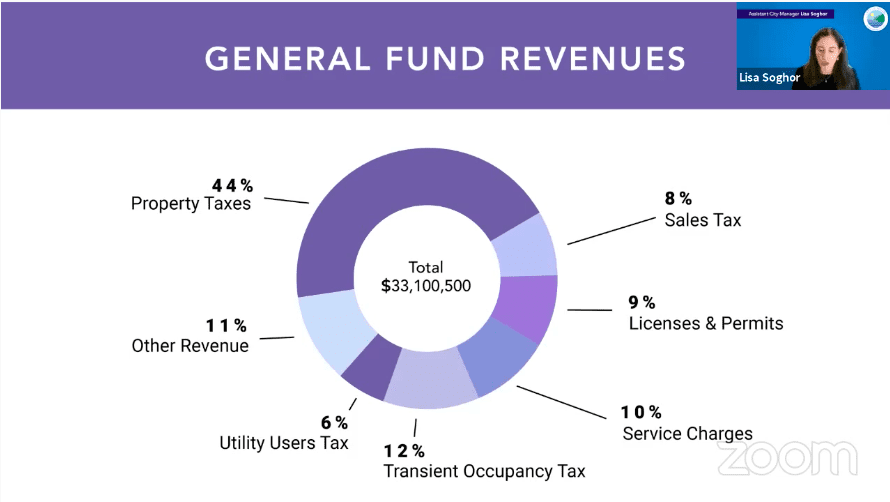The city’s budget is tight going into the 2021-22 budget—very tight.
“As a result of the Woolsey Fire and COVID, we’re now entering into what’s going to be our second year where we don’t have what’s considered balanced budget—meaning we’re going to be using funds from our savings account, our reserves, in order to meet our ongoing operations,” City Manager Reva Feldman told council on Thursday night, April 22.
With short term rental tax plummeting, sales tax from restaurants way down and no guarantee the next fiscal year will offer relief, city staff and council members are grappling with the second straight year of budgetary constraints due to the novel coronavirus pandemic—coming right on the heels of some financial gymnastics that helped the city weather the Woolsey Fire.
“We’ve done a great job in order to find fixes,” Feldman said, adding, “This year we’re able to use a reserve the council has set aside over the past few months, but it’s not a sustainable way to maintain the city’s budget.”
The projection for the next fiscal year, which begins July 1, was that Malibu would take in just about $80 million in revenue. However, expenditures were estimated at $89.71 million.
Staff emphasized the budget was, as it has been in years past, “very conservative,” with expectations that the city may be able to squeeze out a few more dollars from everything from the money still owed by FEMA following Woolsey to a possible uptick in tax revenue if tourism (and associated dining) picks back up.
“The city’s major sales tax contributors are typically restaurants; again, the pandemic was particularly hard on those,” Assistant City Manager Lisa Soghor explained. “Even though we see things right now opening up, we’re still projecting that those numbers will be decreased in the next year and it will take a couple years for it to recover to where they were.”
Also not included in the budget are the $2.2 million the city expects to receive from the federal government under the American Rescue Plan passed earlier this year. Under that stimulus bill, Malibu is expected to receive $1.1 million this June, with another $1.1 million to be injected into the budget at some point next winter.
As graph after graph showed shrinking revenues, one source of city income remained stable: property tax revenue, which Soghor estimated conservatively at $11.9 million in the upcoming fiscal year, up $300,000 from this year’s expected $11.6 million pull—but that number could turn out even higher.
Mayor Mikke Pierson acknowledged the $9.4 million expenditure of the city’s ongoing Woolsey Fire rebuild fee waiver program, which was extended once again this year, saying that this would likely be the last extension on the popular program, as “the last surge [of families beginning their rebuilds] is starting to work their way into the system, at least from what I see.”
As usual, the largest single expenditure in the budget went to public safety, with the city allocating $8.5 million to the LA County Sheriff’s Department—22 percent of the city’s entire annual operating budget and an increase of 1.45 percent over the previous year. Two public safety commissioners who spoke at the meeting—Doug Stewart and Chris Frost—urged council to open up the city’s purse a little wider and also add two additional public safety vehicles to the current fleet, a proposition that was popular among council.
“I wholeheartedly agree with our two public safety commissioners about the need to bolster public safety,” City Council Member Karen Farrer said, although she was open to other suggestions for how best to allocate any available funds. It was decided that the Malibu Administration and Finance Subcommittee—made up of Pierson and City Council Member Steve Uhring—look into adding one to two additional vehicles when they review the budget in coming weeks.
Uhring, Pierson and Mayor Pro Tem Paul Grisanti also all expressed support for further exploring the idea of parking meters as a potential income source, while noting that parking meters could present challenges in placement, since Malibu does not own many of its roads or parking lots, while also representing an eyesore.
Resident Cami Winikoff, a longtime proponent of dark skies protections, also urged the city to employ a dark skies ordinance official to consult with and enforce the ordinance, which blocks certain types of outdoor lighting in order to keep Malibu’s skies dark at night.
Winikoff’s request was also met with support, despite the tight budget.
Pierson made a point to say city staff were overwhelmed due to staff size being cut in last year’s budget and urged his fellow council members to hold off on making too many new requests until new staff members were brought on and up to speed. For that reason, Pierson suggested, dark skies enforcement and additional law enforcement vehicles should be the only two additions to the budget until at least the second quarter of the 2021-22 fiscal year.
“Showing up and speaking up makes a difference—it always does,” Pierson said of Winikoff, Frost and Stewart, the only residents who spoke at the special meeting.
Council will next meet to discuss the budget publicly on May 24. The final budget will be adopted June 28.

